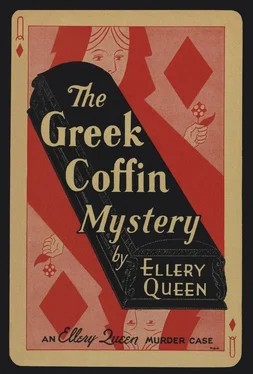“When’s he get back?” demanded Velie truculently.
“No one seems to know.”
“Well, that’s unimportant,” said Pepper. “Now how about the new will?”
“The new will. Yes.” Woodruff looked very cunning. “And here is the mysterious part of it. Last Thursday night, about midnight, I got a telephone call from Khalkis. He told me to bring him on Friday morning — the next morning — the complete draft of a new will. Now get this: the new will was to be an exact duplicate of the existent will except for one change: I was to omit the name of Gilbert Sloane as beneficiary of the Khalkis Galleries and leave the space blank for the insertion of a new name.”
“Sloane, eh?” Pepper and Velie studied the man surreptitiously. He was standing like a pouter pigeon behind Mrs. Sloane’s chair staring glassily into space, and one of his hands was trembling. “Go on, Mr. Woodruff.”
“Well, I had the new will drawn up first thing Friday morning and chased over here with it considerably before noon. I found Khalkis alone. He was always a pretty rocky sort of codger — cold and hard and businesslike as you please — but that morning he was upset about something. Anyway, he made it plain right away that nobody, not even your humble servant, was to know the name of the new beneficiary of his Galleries. I fixed up the will in front of him so that he’d fill in the blank space conveniently — he made me cross over and stand on the other side of the room, mind you! — and then he scribbled a name, I suppose, in the space. He blotted it himself, closed the page quickly, had Miss Brett, Weekes and Mrs. Simms witness his signature, signed the will, sealed it with my assistance, and put it into the small steel box he kept in his safe, locking the box and the safe himself. And there you are — not a soul but Khalkis himself knew who the new beneficiary was!”
They chewed upon that. Then Pepper asked: “Who knew the provisions of the old will?”
“Everybody. It was common gossip about the house. Khalkis himself didn’t make any bones about it. As for the new will, Khalkis hadn’t specifically made a point of keeping quiet about the fact that he was making a new testament, and I didn’t see any reason to hush it up. Naturally, the three witnesses knew it, and I suppose they spread the word around the house.”
“The Sloane guy know it?” rasped Velie.
Woodruff nodded. “I should say he did! In fact, that afternoon he called at my office — evidently he’d already heard that Khalkis had signed a new will — and wanted to know if the change affected him in any way. Well, I told him that somebody was taking his place, who exactly nobody knew but Khalkis himself, and he—”
Pepper’s eyes flashed. “Damn it all, Mr. Woodruff, you had no right to do that!”
Woodruff said weakly: “Well, now, Pepper, maybe it wasn’t the... But you see, I figured that maybe Mrs. Sloane was the new beneficiary, and in that case Sloane would get the Galleries through her, so he wouldn’t be losing anything anyway.”
“Oh, come now,” said Pepper with a snap in his voice, “it was an unethical thing to do. Ill-advised. Well, no use crying over spilt milk. When you looked at the new will in the box five minutes before the funeral, did you find out then who the new beneficiary was?”
“No. I didn’t mean to open the will until after the funeral.”
“You’re sure it was the authentic document?”
“Positive.”
“Did the new will have a revocation clause?”
“It did.”
“What’s that?” growled Velie suspiciously. “What’s that mean?”
“Plenty to give us a headache,” said Pepper. “The inclusion of a revocation clause in a new will is made to establish the intention of testator to revoke all previous testaments. That means that the old will in force up to last Friday morning is voided whether the new will is found or not. And,” he added grimly, “if we don’t find the new will and can’t establish the identity of the new beneficiary for the Galleries, Khalkis will be considered to have died intestate. A rotten mess!”
“That means,” said Woodruff gloomily, “that Khalkis’ estate will have to be apportioned by law strictly according to the tenets of inheritance.”
“I get it,” rumbled Velie. “This Sloane guy comes in for his cut no matter what happens, just as long as that new will isn’t found. Khalkis’ next of kin is his sister, Mrs. Sloane, I reckon... Pretty smart!”
Edmund Crewe, who had been slipping in and out of the library like a wraith, hurled the blueprints on the desk and approached the three men. “Well, Eddie?” demanded Velie.
“No can find. No panels or secret closets. No interstices in the walls left by improper mating of two rooms. Ceilings and floors solid — they made ’em that way in the old days.”
“Damn!” said Pepper.
“No, sirree,” continued the architectural expert. “If the will isn’t on any one’s person in this house, you take it from me that it isn’t in the house at all.”
“But it must be!” said Pepper with exasperation.
“Well, it isn’t, younker.” Crewe marched out of the room and they heard the bang of the front door a moment later.
The three men said nothing, eloquently. Velie without explanation thundered out of the study, to return some minutes later harder-jawed than ever. A sour helplessness radiated from his mammoth bulk. “Pepper,” he said dourly, “I give up. Just went over that court and graveyard myself. Nothing doing. Must’ve been destroyed. How do you stand?”
“I have an idea,” said Pepper, “but that’s all. I’ll have to talk it over with the Chief first.”
Velie thrust his fists into his pockets, surveying the battleground. “Well,” he grumbled, “I’m washed up. Listen, folks.” They had been listening; but all vitality had been drained out of them by the cloying wait, and they stared at Velie with doggy eyes. “When I leave this house, I’m closing up this room and those two others beyond. Understand? Nobody is to come in here. Nobody is to touch Khalkis’ room either, or Demetrios Khalkis’ — leave everything exactly as it is. And one more thing. You can come and go in and out of the house as you please, but you’ll be searched every single time, so don’t anybody try any funny stuff. That’s all.”
“I say.” Some one had spoken in a cavernous voice. Velie turned slowly. Dr. Wardes was coming forward — a man of middle height, bearded like one of the old prophets, but with a physique almost simian. His very bright brown eyes, set closely together, regarded Sergeant Velie almost with humor.
“What do you want?” Velie bristled, wide-legged, on the rug.
The physician smiled. “Your orders will not put any of the regular residents of this house to great inconvenience, don’t you know, Sergeant, but they will affect me most unpleasantly. You see, I’ve been merely a guest here. Must I intrude on the hospitality of this very sad establishment indefinitely?”
“Say, who are you, anyway?” Velie moved a ponderous step forward.
“My name is Wardes, and I am a citizen of Great Britain and a humble subject of His Majesty the King,” replied the bearded man, twinkling. “I’m a medico — eye specialist. I’ve been having Mr. Khalkis under observation for some weeks.”
Velie grunted. Pepper moved to his side and whispered. Velie nodded, and Pepper said: “Naturally, Dr. Wardes, we don’t want to embarrass you or your hosts. You are perfectly free to leave. Of course,” he continued smiling, “you won’t object to a last formality — a thorough search of your person and luggage on going away?”
“Object? Certainly not, sir.” Dr. Wardes played with his shaggy brown beard. “On the other hand—”
Читать дальше












